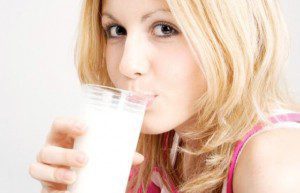By Teresa Sievers, MD, MSMS, FAARM –
Dear Dr. Sievers,
I recently had a bone density test that revealed bone loss. My doctor told me that I need to start drinking more milk and other dairy products, but I don’t like them. Is there another way I can get the calcium I need? Natalie
 Dear Natalie,
Dear Natalie,
While you clearly need to increase your calcium intake, dairy is not your only option. In fact, there are more effective, healthier ways to add calcium into your diet. As a physician, board certified in Internal Medicine and Fellowship trained in Anti-Aging, Regenerative and Functional Medicine, I am aware of many studies that have raised questions about the relationship between dairy products and bone health. There is no doubt that calcium is key for bone health, and lack of it can lead to life threatening diseases. Over 12 million people, 80% of whom are women, suffer from osteoporosis with 20% or more dying within the first 12 months after a hip fracture; 50% unable to walk without assistance and 25% requiring nursing home care.
Women have probably been brainwashed the most about milk and other dairy products being the best prevention for bone loss. But The Nurse’s Health Study, which followed 72,000 women, found that milk consumption was not associated with a lower risk of hip fracture. In fact, those who drank milk daily were as likely to have a fracture as those who drank it once a week.
Interestingly, according to T. Collin Campbell, PhD and author of The China Study, “The countries with the highest cow’s milk intake and its products have the highest rates of fractures.” One explanation might be that if a country is wealthy enough to drink a lot of milk, then they may also indulge in other luxuries such as excess alcohol, caffeine and smoking, which also contribute to bone loss. Furthermore, milk pasteurization destroys 32% of the available calcium. While foodies—people with an avid interest in the latest food fads—believe drinking raw milk improves calcium intake, but it does put one at risk for serious infection.
As an animal protein, milk, as well as all animal proteins such as meat, dairy (and even grains), can make the body more acidic. However, the body functions optimally when it is slightly more alkaline. An alkaline environment not only promotes bone health, but it also makes it more difficult for cancer cells to survive, decreases infections in the body and decreases the aging process. Additionally, when your body is in an alkaline environment you may have stronger bones and less aches and pains. When the body is more acidic, it attempts to balance the acidity by leaching minerals from the bones which are more alkaline, thus leaving the bones depleted of bone building ingredients. (Drinking soda, diet or not, does the same thing.) A great way to alkalize the body is by adding fresh squeezed lemon to your drinking water. Although lemons are acidic, the acidity a food has before it is put in the body has no bearing on how acidic it is after it is put in the body. When ingested, lemon actually has an alkalizing effect. And more importantly it decreases acidifying foods like caffeine, soda and other sugary drinks, as well as artificial sweeteners.
How should you get your calcium?
Start with your diet. Overall, plant based diets are more alkaline and have lots of calcium. Kale and collard greens have about 250 mg of calcium per 3.5 ounces (about 1.25 cups cooked), while the same quantity in yogurt is about 252 mg and milk 291 mg. Two cups of broccoli has nearly 200 mg of calcium. Seeds are another option with sesame seeds among the highest: 1160 mg in 3.5 ounces. The same volume of almonds has 234 mg. And many non-dairy milks, such a rice and almond milk are fortified with same amount of calcium as cow’s milk. Ideally, get at least half of your requirements from food rather than supplements.
For ages women were told that TUMs was a great source of calcium. This is another myth that needs clarification. First, you need adequate stomach acid to absorb calcium and by definition, TUMS is an antacid. Also, the calcium found in TUMS is calcium carbonate. Better, more absorbable forms are calcium hydroxyapatite and citrate if you have history of calcium kidney stones. Intake amounts are decreasing as issues with excess calcium, especially when taken without vitamin K, can actually increase calcium deposition in the coronary arteries, thus increasing risk of heart disease. I usually recommend about1000-1200 mg per day for post-menopausal women, and for men, depending on their age, about 800- 1000 of calcium. Ideally, at least half if not more of that should come from your diet. And the quality of supplements is crucial, as cheaper brands have been shown to be tainted with heavy metals which worsen bone loss.
I would recommend working with Coach Karen to help you balance your diet to include calcium rich foods. In addition, I would prescribe, high quality supplements to ensure your calcium intake, as well as other nutrients, are meeting recommended daily requirements to be sure your body systems are functioning optimally.
Teresa A. Sievers, MD
Restorative Health & Healing Center
10201 Arcos Av., Suite 201, Estero
Learn more about Dr. Sievers at:
www.rhhcenter.com
Karen R. Callan, CHC, AADP
Certified Health Coach
10201 Arcos Ave., Suite 201 Estero
239-405-9169
Learn More About BEST BODY NOW at:
www.lovemybestbodynow.com









